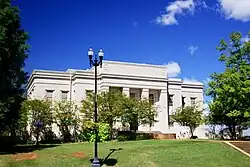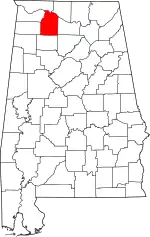Moulton, Alabama | |
|---|---|
 Lawrence County Courthouse | |
 Location of Moulton in Lawrence County, Alabama. | |
| Coordinates: 34°28′56″N 87°17′8″W / 34.48222°N 87.28556°W | |
| Country | United States |
| State | Alabama |
| County | Lawrence |
| Incorporated | December 17, 1819[1] |
| Area | |
| • Total | 6.01 sq mi (15.56 km2) |
| • Land | 5.99 sq mi (15.53 km2) |
| • Water | 0.01 sq mi (0.04 km2) |
| Elevation | 643 ft (196 m) |
| Population (2020) | |
| • Total | 3,398 |
| • Density | 566.90/sq mi (218.87/km2) |
| Time zone | UTC-6 (Central (CST)) |
| • Summer (DST) | UTC-5 (CDT) |
| ZIP code | 35650 |
| Area code | 256 |
| FIPS code | 01-51600 |
| GNIS feature ID | 2404314[3] |
| Website | cityofmoultonal |
Moulton is a city in Lawrence County, Alabama, and is included in the Decatur Metropolitan Area, as well as the Huntsville-Decatur Combined Statistical Area. Although it incorporated in 1819,[4] along with its rival of Courtland, to compete for the honor of county seat, it did not first appear on the U.S. Census rolls until 1900. As of the 2010 census, the population of the city is 3,471, its record high. The city has been the county seat of Lawrence County since 1820. It has been the largest community in the county since the 1920 U.S. Census.[5]
History
By the time Alabama became a state in 1819, an inn had been erected at the site of what is now Moulton to serve migrants along the various early paths that passed through the area. Shortly after Alabama achieved statehood, both Moulton and Courtland (to the north) incorporated and competed for the county seat of Lawrence County. Governor Thomas Bibb awarded the seat to Moulton as the most centrally located of the two within the county.[6] The city is named for Lieutenant Michael Moulton, a soldier killed while fighting under General Andrew Jackson at the Battle of Horseshoe Bend in 1814.[4]
Geography
Moulton is located at 34°28′56″N 87°17′8″W / 34.48222°N 87.28556°W (34.482307, -87.285621).[7] The city is concentrated along Alabama State Route 33 southwest of Decatur. Alabama State Route 24 passes through the northern part of the city, and Alabama State Route 157 passes through its eastern section. The William B. Bankhead National Forest lies to the southwest of Moulton.
According to the U.S. Census Bureau, the city has a total area of 5.9 square miles (15 km2), all land.
Climate
According to the Köppen climate classification, Moulton has a humid subtropical climate (abbreviated Cfa).
| Climate data for Moulton, Alabama, 1991–2020 normals, extremes 1957–present | |||||||||||||
|---|---|---|---|---|---|---|---|---|---|---|---|---|---|
| Month | Jan | Feb | Mar | Apr | May | Jun | Jul | Aug | Sep | Oct | Nov | Dec | Year |
| Record high °F (°C) | 78 (26) |
85 (29) |
87 (31) |
90 (32) |
96 (36) |
103 (39) |
106 (41) |
103 (39) |
102 (39) |
96 (36) |
86 (30) |
79 (26) |
106 (41) |
| Mean maximum °F (°C) | 69.8 (21.0) |
74.2 (23.4) |
80.6 (27.0) |
84.7 (29.3) |
88.8 (31.6) |
93.4 (34.1) |
95.5 (35.3) |
95.7 (35.4) |
92.9 (33.8) |
86.3 (30.2) |
78.2 (25.7) |
70.7 (21.5) |
97.3 (36.3) |
| Mean daily maximum °F (°C) | 50.6 (10.3) |
54.8 (12.7) |
63.4 (17.4) |
72.0 (22.2) |
79.1 (26.2) |
85.8 (29.9) |
88.4 (31.3) |
88.4 (31.3) |
83.6 (28.7) |
73.5 (23.1) |
61.9 (16.6) |
53.2 (11.8) |
71.2 (21.8) |
| Daily mean °F (°C) | 40.3 (4.6) |
43.8 (6.6) |
51.9 (11.1) |
60.3 (15.7) |
68.3 (20.2) |
75.3 (24.1) |
78.4 (25.8) |
77.8 (25.4) |
72.1 (22.3) |
61.0 (16.1) |
50.1 (10.1) |
42.9 (6.1) |
60.2 (15.7) |
| Mean daily minimum °F (°C) | 30.0 (−1.1) |
32.9 (0.5) |
40.3 (4.6) |
48.6 (9.2) |
57.4 (14.1) |
64.9 (18.3) |
68.4 (20.2) |
67.2 (19.6) |
60.7 (15.9) |
48.5 (9.2) |
38.3 (3.5) |
32.6 (0.3) |
49.2 (9.5) |
| Mean minimum °F (°C) | 12.6 (−10.8) |
16.9 (−8.4) |
22.4 (−5.3) |
31.7 (−0.2) |
42.3 (5.7) |
54.1 (12.3) |
60.6 (15.9) |
58.8 (14.9) |
45.8 (7.7) |
32.1 (0.1) |
22.3 (−5.4) |
18.2 (−7.7) |
9.9 (−12.3) |
| Record low °F (°C) | −13 (−25) |
−8 (−22) |
0 (−18) |
23 (−5) |
33 (1) |
41 (5) |
52 (11) |
50 (10) |
35 (2) |
25 (−4) |
12 (−11) |
−5 (−21) |
−13 (−25) |
| Average precipitation inches (mm) | 5.33 (135) |
5.63 (143) |
5.72 (145) |
5.45 (138) |
5.18 (132) |
4.57 (116) |
5.06 (129) |
4.25 (108) |
4.05 (103) |
4.21 (107) |
4.37 (111) |
6.39 (162) |
60.21 (1,529) |
| Average snowfall inches (cm) | 0.5 (1.3) |
0.9 (2.3) |
0.5 (1.3) |
0.0 (0.0) |
0.0 (0.0) |
0.0 (0.0) |
0.0 (0.0) |
0.0 (0.0) |
0.0 (0.0) |
0.0 (0.0) |
0.0 (0.0) |
0.2 (0.51) |
2.1 (5.41) |
| Average precipitation days (≥ 0.01 in) | 11.9 | 11.6 | 12.7 | 9.7 | 10.4 | 10.6 | 11.3 | 9.6 | 7.6 | 7.6 | 8.9 | 12.0 | 123.9 |
| Average snowy days (≥ 0.1 in) | 0.4 | 0.4 | 0.2 | 0.0 | 0.0 | 0.0 | 0.0 | 0.0 | 0.0 | 0.0 | 0.0 | 0.3 | 1.3 |
| Source 1: NOAA[8] | |||||||||||||
| Source 2: National Weather Service[9] | |||||||||||||
Demographics
| Census | Pop. | Note | %± |
|---|---|---|---|
| 1900 | 290 | — | |
| 1910 | 354 | 22.1% | |
| 1920 | 519 | 46.6% | |
| 1930 | 639 | 23.1% | |
| 1940 | 752 | 17.7% | |
| 1950 | 1,384 | 84.0% | |
| 1960 | 1,716 | 24.0% | |
| 1970 | 2,470 | 43.9% | |
| 1980 | 3,197 | 29.4% | |
| 1990 | 3,248 | 1.6% | |
| 2000 | 3,260 | 0.4% | |
| 2010 | 3,471 | 6.5% | |
| 2020 | 3,398 | −2.1% | |
| U.S. Decennial Census[10] 2013 Estimate[11] | |||
2020 census
| Race | Num. | Perc. |
|---|---|---|
| White (non-Hispanic) | 2,474 | 72.81% |
| Black or African American (non-Hispanic) | 416 | 12.24% |
| Native American | 99 | 2.91% |
| Asian | 20 | 0.59% |
| Pacific Islander | 1 | 0.03% |
| Other/Mixed | 223 | 6.56% |
| Hispanic or Latino | 165 | 4.86% |
As of the 2020 United States census, there were 3,398 people, 1,457 households, and 815 families residing in the city.
2010 census
As of the census[13] of 2010, there were 3,471 people, 1,482 households, and 912 families residing in the city. The population density was 552.1 inhabitants per square mile (213.2/km2). There were 1,486 housing units at an average density of 251.7 per square mile (97.2/km2). The racial makeup of the city was 78.2% White, 13.1% Black or African American, 4.1% Native American, 0.4% Asian, 0.2% from other races, and 4.1% from two or more races. 1.6% of the population were Hispanic or Latino of any race.
There were 1,482 households, out of which 25.4% had children under the age of 18 living with them, 43.7% were married couples living together, 14.0% had a female householder with no husband present, and 38.5% were non-families. 36.1% of all households were made up of individuals, and 18.1% had someone living alone who was 65 years of age or older. The average household size was 2.19 and the average family size was 2.84.
In the city, the population was spread out, with 20.7% under the age of 18, 7.6% from 18 to 24, 26.7% from 25 to 44, 23.1% from 45 to 64, and 21.8% who were 65 years of age or older. The median age was 41 years. For every 100 females, there were 81.7 males. For every 100 females age 18 and over, there were 77.2 males.
The median income for a household in the city was $32,639, and the median income for a family was $49,243. Males had a median income of $52,279 versus $30,000 for females. The per capita income for the city was $20,696. About 8.3% of families and 15.8% of the population were below the poverty line, including 23.9% of those under age 18 and 15.2% of those age 65 or over.
Media
Moulton is home to one radio station, WALW-LP (97.9 FM)
The county's only newspaper, The Moulton Advertiser, resides in Moulton.[14]
Transportation
State highways
Notable people
- Jim Blevins, former Head Football Coach at Jacksonville State University from 1965 to 1968.
- Edward B. Almon, U.S. Representative representing Alabama's 8th congressional district from 1915 to 1933.
- Lucas Black, actor, notably in Friday Night Lights and Fast and the Furious: Tokyo Drift
- Mary Lee Cagle, one of the first influential women and pastors in the Church of the Nazarene
- Kimberley Conrad (born 1963), American model and actress, former Playboy playmate (January 1988) and Playmate of the Year (1989)
- Asa Hodges, U.S. representative from Arkansas.
- John Wallace Jones, Mayor of Shreveport, Louisiana from 1854 to 1858.
- Thomas Minott Peters, lawyer and botanist
- Phillip Roddey, brigadier general in the army of the Confederate States of America during the American Civil War
- David Stewart, American football offensive tackle; graduated from Lawrence County High School.
References
- ↑ A Digest of the Laws of the State of Alabama: Containing The Statutes and Resolutions in Force at the end of the General Assembly in January, 1823. Published by Ginn & Curtis, J. & J. Harper, Printers, New-York, 1828. Title 62. Chapter XXXV. Pages 813-814. "An Act to Incorporate the Town of Moulton, in the County of Lawrence.—Passed December 17, 1819." (Google Books)
- ↑ "2020 U.S. Gazetteer Files". United States Census Bureau. Retrieved October 29, 2021.
- 1 2 U.S. Geological Survey Geographic Names Information System: Moulton, Alabama
- 1 2 History, City of Moulton official site. Accessed 27 September 2018.
- ↑ 1820-2010 U.S. Censuses research on Lawrence County, Alabama Communities
- ↑ "Moulton," Encyclopedia of Alabama, 8 August 2018.
- ↑ "US Gazetteer files: 2010, 2000, and 1990". United States Census Bureau. February 12, 2011. Retrieved April 23, 2011.
- ↑ "U.S. Climate Normals Quick Access – Station: Moulton 2, AL". National Oceanic and Atmospheric Administration. Retrieved June 16, 2023.
- ↑ "NOAA Online Weather Data – NWS Huntsville". National Weather Service. Retrieved June 16, 2023.
- ↑ "U.S. Decennial Census". Census.gov. Retrieved June 6, 2013.
- ↑ "Annual Estimates of the Resident Population: April 1, 2010 to July 1, 2013". Retrieved June 3, 2014.
- ↑ "Explore Census Data". data.census.gov. Retrieved December 14, 2021.
- ↑ "U.S. Census website". United States Census Bureau. Retrieved January 31, 2008.
- ↑ The Moulton Advertiser, official site. Accessed 27 September 2018.
External links
 Media related to Moulton, Alabama at Wikimedia Commons
Media related to Moulton, Alabama at Wikimedia Commons
